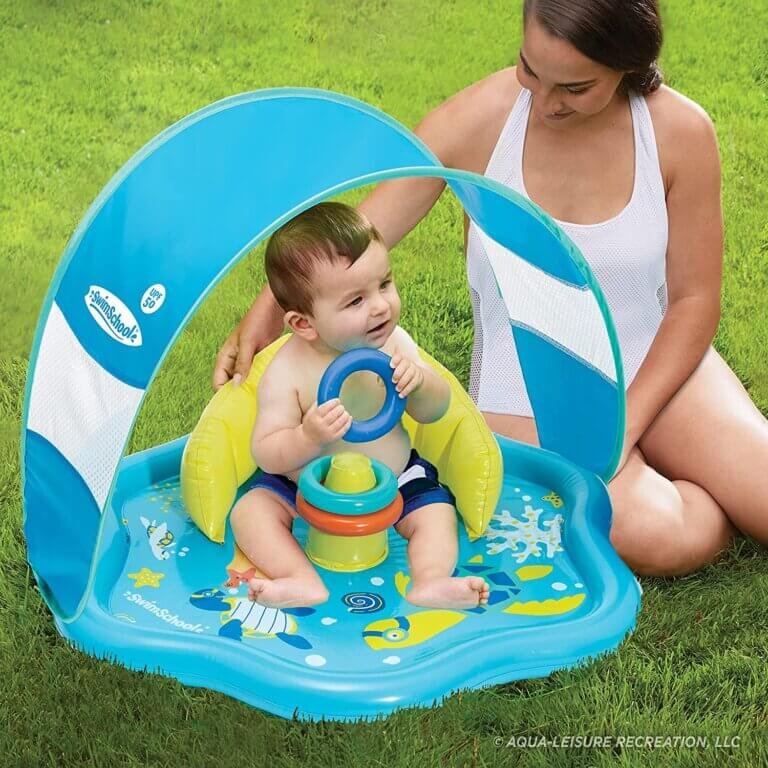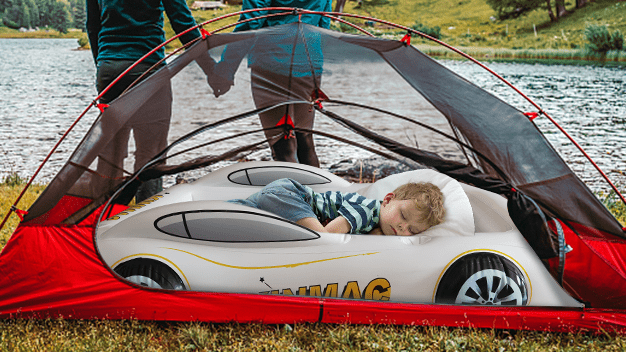
At what age can you fly with a new baby?
Yes, it is generally safe for a 2-month-old baby to travel on a plane, but there are a few important considerations to keep in mind:
1. Health and Medical Clearance
Before flying with a newborn, it’s recommended to consult your pediatrician to ensure that your baby is healthy enough for travel. Some infants might have specific medical conditions that could be exacerbated by the changes in pressure and altitude during a flight.
2. Immune System
A 2-month-old baby’s immune system is still developing, which means they might be more susceptible to illnesses. Airports and airplanes can be crowded places where germs can easily spread. Take precautions to minimize your baby’s exposure to germs, such as washing hands frequently and avoiding contact with sick individuals.
3. Feeding and Comfort
Babies at this age might need to be fed frequently, and the pressure changes during takeoff and landing can be uncomfortable for their ears. Feeding or using a pacifier during these times can help alleviate the pressure in their ears.
4. Seat Selection
When booking your flight, consider choosing seats that provide easy access for feeding and changing diapers. Many airlines also offer bassinets or carrycot positions for infants on long-haul flights. However, these amenities may need to be reserved in advance.
5. Documentation
Depending on the airline and destination, you might need to provide certain documentation for your baby, such as a birth certificate or a passport, even for domestic flights.
6. Baggage and Supplies
Be sure to pack all your baby’s essentials during the flight, such as diapers, wipes, extra clothes, formula or breast milk, bottles, pacifiers, and any medications.
7. Hydration
The cabin air on planes can be quite dry, so keeping your baby hydrated is important. You might want to consult your pediatrician about providing some water in addition to breast milk or formula.
8. Time of Travel
Try to choose flight times that align with your baby’s sleep schedule. This might make the journey more comfortable for both you and the baby.
9. Support and Assistance
Traveling with a baby can be challenging, so consider bringing a companion who can help you manage everything and provide support.
Conclusion about: Can A 2 Month Old Baby Travel On A Plane
The decision to travel with a 2-month-old baby on a plane involves carefully considering various factors. While it is generally possible to travel with an infant of this age, parents and caregivers need to prioritize the baby’s safety, comfort, and well-being throughout the journey.
Consulting with a pediatrician before the trip is advisable, as they can provide personalized guidance based on the baby’s health and development. Parents should also consider the specific airline’s policies and regulations regarding infant travel, including necessary documentation and seating arrangements.
Traveling with a 2-month-old may present challenges such as changes in air pressure, cabin noise, and potential exposure to germs. To mitigate these challenges, parents can consider feeding or providing a pacifier to help with ear pressure, carrying essential baby supplies, and maintaining good hygiene.
Ultimately, the decision to travel with a 2-month-old on a plane should be made after careful consideration of the baby’s readiness, the potential risks, and the measures that can be taken to ensure a safe and comfortable journey. Flexibility and preparedness are key, as unexpected situations may arise. By prioritizing the baby’s needs and planning, parents can make the travel experience as smooth as possible for both themselves and their infant.
Read also: How To Travel With 8-Month-Old Baby?
FAQS
When can a newborn fly internationally?
The safety and appropriateness of traveling with a newborn or young baby, whether by car or plane, depend on various factors, including the baby’s health, the mode of transportation, and the recommendations of healthcare professionals. Here are some general guidelines:
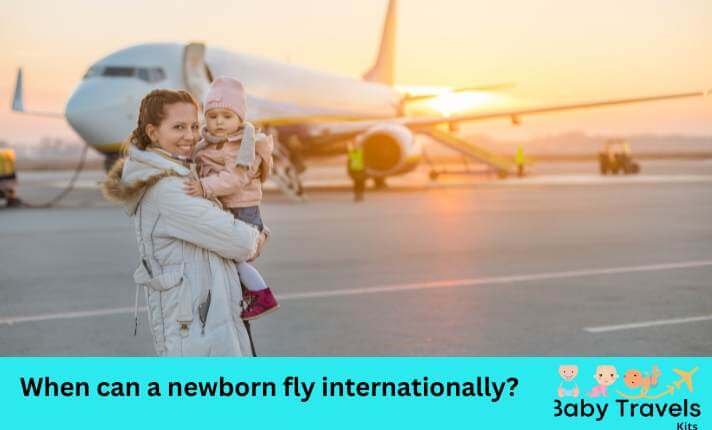
Related: 5 Best Travel Booster Seats for Eating in 2024
1. Flying with a Newborn:
-
- Many airlines allow infants to fly as early as 2 weeks old, but waiting until the baby is at least 7-10 days old is recommended to ensure they have stabilized after birth.
- Consult your pediatrician before making any travel plans, especially for long flights or if your baby was born prematurely or has health concerns.
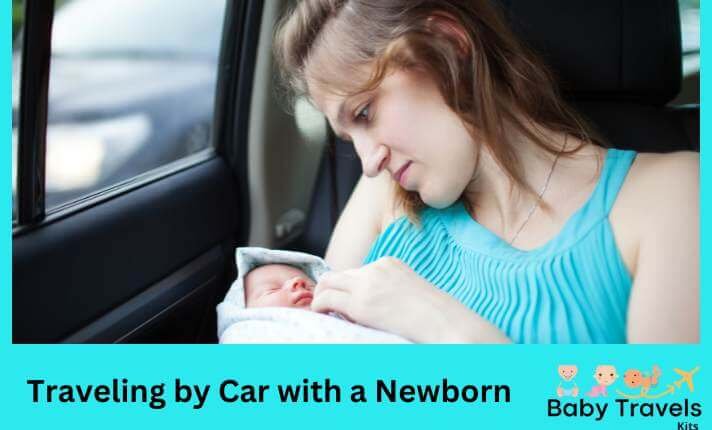
2. Traveling by Car with a Newborn:
-
- In general, newborns can travel in a car from birth, but it’s important to follow car seat safety guidelines and ensure proper car seat installation.
- Ensure the car seat is rear-facing and appropriate for the baby’s age and weight.
- Plan for frequent stops to allow for feeding, diaper changes, and stretching.
3. International Travel with a Newborn:
-
- International travel with a newborn requires careful planning due to potential changes in time zones, climate, and health regulations.
- It’s advisable to wait until the baby is a few months old before considering international travel, as newborns are more susceptible to infections and changes in routine.
4. Traveling with a 3-Month-Old Baby:
-
- Many parents choose to wait until their baby is around 3 months old to travel, as this allows the baby to establish a feeding and sleeping routine, and they might have received some vaccinations by this time.
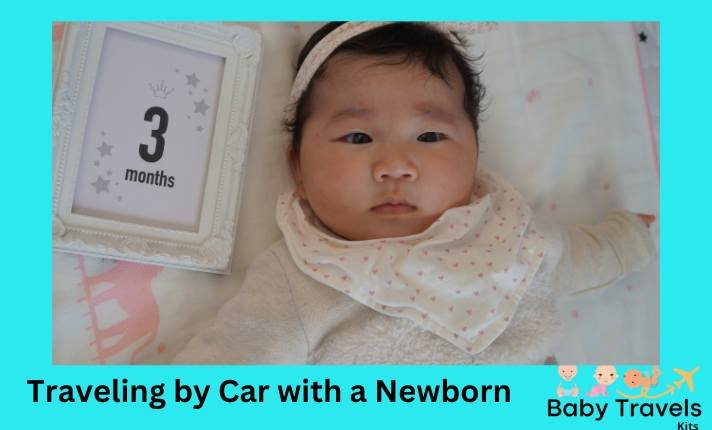
- Many parents choose to wait until their baby is around 3 months old to travel, as this allows the baby to establish a feeding and sleeping routine, and they might have received some vaccinations by this time.
5. Safety Considerations:
-
- Consult your pediatrician before any travel, especially if your baby has any medical conditions or special needs.
- Follow recommended guidelines for car seat use and secure the baby properly in an appropriate car seat when traveling by car.
- When flying, ensure you have all necessary documents for the baby, such as a birth certificate, and check the specific airline’s policies on traveling with infants.
It is a good idea to check with airlines, car rental companies, and accommodations in advance to understand their policies and accommodations for traveling with infants.
Related: What are Good Hacks for Traveling with Babies / Toddlers on Long Flights?
Is it safe to fly with a 2-month-old baby?
Flying with a 2-month-old baby can be safe if proper precautions are taken. However, it’s essential to consult with your pediatrician before making any travel plans. Babies’ immune systems are still developing, so exposure to crowded environments like airports and airplanes may increase the risk of infections. Additionally, changes in air pressure during takeoff and landing can affect their delicate ears. Ensuring your baby’s vaccinations are up to date and taking necessary hygiene measures can help minimize risks.
What is the best age to fly with a baby?
The ideal age to fly with a baby varies for each child and depends on factors such as their health, development, and the purpose of travel. Many parents find that infants between 3 and 6 months old are more adaptable to travel because they are past the newborn stage but have not yet reached the more active and mobile phase. However, consult with your pediatrician to determine the best time based on your baby’s individual needs and circumstances.
How do I take care of my 2-month-old on a plane?
Taking care of a 2-month-old on a plane involves several considerations. Ensure you have all necessary supplies, such as diapers, wipes, formula or breast milk, and a change of clothes, readily accessible in your carry-on bag. Feed your baby during takeoff and landing to help alleviate ear pressure. Consider bringing comforting items from home, such as a favorite blanket or toy, to soothe them during the flight. Additionally, try to stick to your baby’s usual routine as much as possible to keep them comfortable and minimize disruptions.
What is the minimum age to fly?
There is no universal minimum age for flying with a baby, as policies vary by airline and destination. Most airlines allow infants as young as a few days old to fly, but they may require a doctor’s clearance for newborns under a certain age, typically within the first week of life. It’s essential to check with the airline you plan to fly with and review their specific policies regarding infant travel.
How do I protect my baby’s ears from flying?
To protect your baby’s ears from discomfort during takeoff and landing, encourage swallowing by breastfeeding, bottle-feeding, or offering a pacifier. The sucking motion helps equalize the pressure in their ears. You can also try using earplugs specially designed for infants or covering their ears with a soft cloth or blanket. Additionally, avoid flying if your baby has a cold or congestion, as it can exacerbate ear pain.
Do babies need ID to fly?
Most airlines do not require infants under the age of 2 to have their own ID for domestic flights within the United States. However, you may need to provide proof of age, such as a birth certificate, when checking in your baby for the flight. For international travel, some countries may require a passport or other identification for infants, so it’s essential to check the specific requirements of your destination and airline before traveling.

